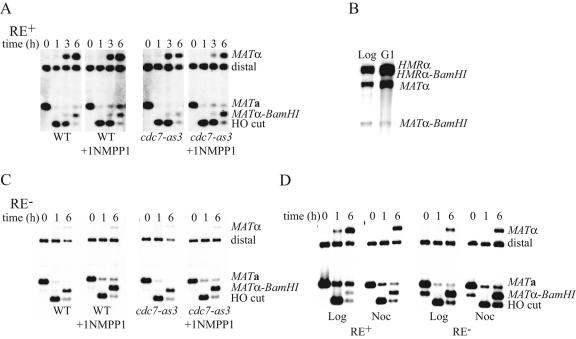FIG. 5.
Donor preference is affected by an arrest in G1/S and in G2/M in MATa cells but not in cells with RE deleted. (A) Time course experiment of MAT switching in MATa CDC7 (XW652) and MATa cdc7-as3 (GI560) cells arrested or not by the ATP analogue NMPP1. Genomic DNA cut with the restriction enzymes StyI and BamHI and probed with a MAT distal fragment reveals the parental fragment MATa, the fragment resulting from the HO cut, and the MATα and MATα-BamHI products. (B) Expression of HO under a Gal promoter specific for the G1 phase does not affect donor preference in MATa cells. Genomic DNA of the WT strain used in panel A (XW652) and of a G1-Gal-HO strain (ECY273) here digested with HindIII and BamHI and probed with Yα sequences shows the two products, MATα and MATα-BamHI. (C) The same experiment as in panel A but carried out in strains with RE deleted, thus mimicking MATα cells (WT, XW676; cdc7-as3, ECY252). (D) MATa switching in strains with RE deleted or not (XW676 and XW652, respectively). HO is induced in exponential phase (Log) or when cells are arrested in the presence of nocodazole (Noc). Genomic DNA was cut with StyI and BamHI and probed with a MAT distal fragment.

